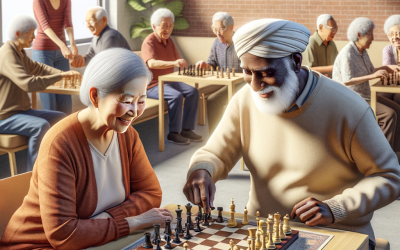Ah, the golden years! A time when we can finally indulge in activities that tickle our fancy, without the constraints of work or raising little ones. But as a retired teacher and a doting grandmother, I’ve realized that it’s not just fun we should seek; it’s a chance to nurture our well-being, especially our mental faculties. That’s where hobbies that boost memory, those proven brain essentials, come into play.
Understanding the Importance of Memory-Boosting Hobbies
As our years advance, isn’t it just typical that the things we want to hold onto most dearly seem to slip away? I remember the first time I blanked on a friend’s name—I was mortified! It was a wake-up call that I needed to do more than crosswords. I needed a variety of senior brain activities that tickled my neurons and kept them lively.
Science backs this up. Engaging in diverse activities isn’t just delightful––it’s a necessity for maintaining cognitive health. Let’s dive into some activities that have helped me, and could help you or your loved one, keep the mind sharp and spry.
Jigsaw Puzzles: A Classic Memory Exercise
You might scoff at puzzles as child’s play, but they are much more. Putting together a puzzle requires you to engage in problem-solving, pattern recognition, and memory use. It’s like a multivitamin for the brain! I always have a puzzle on the go and find it incredibly satisfying to see the pieces fit together just right.
Benefits of Jigsaw Puzzles
- Improves short-term memory by recalling different pieces’ positions
- Enhances visual and spatial reasoning
- Provides a sense of achievement and stress relief
Once, while visiting my eldest son, I challenged him to a puzzle-off. The joy and competitive spirit not only strengthened our bond but kept my mind agile. You’d marvel at how something so simple can be so beneficial.
Gardening: Nature’s Memory Tonic
When spring rolls around, nothing gets me outside faster than the thought of digging into rich soil. Gardening isn’t just good for the body; it’s a feast for the brain. It encourages planning, problem-solving, and memory recall—remembering all those pesky plant names and care instructions!
Why Gardening Works
- Requires monitoring plant growth and schedules
- Encourages learning about biodiversity
- Reduces stress, which is linked to better memory
A few years back, when teaching at the community center garden, I learned that the focused attention demanded by gardening cultivates mindfulness, a skill linked to enhanced cognitive function. You’ll come to see tending to plants as tending to your brain, too.
Art and Craft: A Canvas of Creativity and Memory
There’s a watercolor painting hanging in my hallway that I’m particularly proud of. It reminds me of the long-forgotten creative spirit I resurrected after retirement. Engaging in art, whether it’s painting, knitting, or pottery, has profound benefits for mental health and memory.
Advantages of Artistic Endeavors
- Stimulates creativity and memory through design planning
- Requires concentration, enhancing focus
- Provides satisfaction and boosts mood, combating memory-dulling depression
Crafting brings stories to life. As I knit little booties for my youngest grandchild, I can often be found recounting tales of my own childhood to my daughter. These activities not only connect generations but also weave together past and present memories in delightful new ways.
Learning a Musical Instrument: Harmonizing Memory and Skill
Imagine my delight when my grandchildren gifted me a ukulele—their cheeky way of saying I needed a hobby! Learning to play an instrument is no small feat, but it’s one of the best ways to keep your brain sharp. Music demands understanding and memory—recall of notes, rhythms, and melodies.
Musical Memory Enhancements
- Strengthens connections between brain regions
- Improves auditory processing and verbal memory
- Boosts emotional well-being, enhancing memory retention
In a house full of laughter, when we gather to sing, I feel the strings of the past humming through the present. Even when hitting a wrong note, the joy and mental workout are profound.
Actionable Tips for Engaging in Memory-Boosting Hobbies
Starting out with a new hobby might seem daunting, but I assure you, it’s more about enjoying the journey than achieving perfection. Here are some tips to help get started:
- Choose Wisely: Pick an activity that excites and challenges you.
- Set Small Goals: Break the activity into manageable tasks.
- Join a Group: Engaging with others makes it social and more enjoyable.
- Practice Regularly: Consistency leads to better memory benefits.
- Celebrate Progress: Acknowledge milestones to keep motivated.
FAQ: Discovering Hobbies That Boost Memory
- Can hobbies really improve memory?
Absolutely! Engaging in hobbies challenges your brain, which aids memory retention and cognitive function.
- What hobby is best for memory improvement?
There’s no single best hobby. Choose one you love that incorporates learning and challenge to maximize benefits.
- Can these activities be started at any age?
Yes, it’s never too late to start. Picking up a hobby can be beneficial at any age.
- How often should I engage in these activities?
Aim for consistent engagement, such as a few times a week, to see significant benefits.
- Do group activities offer more benefits than solo ones?
Group activities offer social interaction and motivation but choose what best suits your personality and lifestyle.
And there you have it, a guide from one who’s walked the path and is enjoying the fruits. Approaching life with a curious mind and the willingness to embrace new hobbies is a powerful choice. These senior brain activities are a treasure trove of memory-boosting goodness—unveiling not only a sharper mind but also a joyful heart.




0 Comments